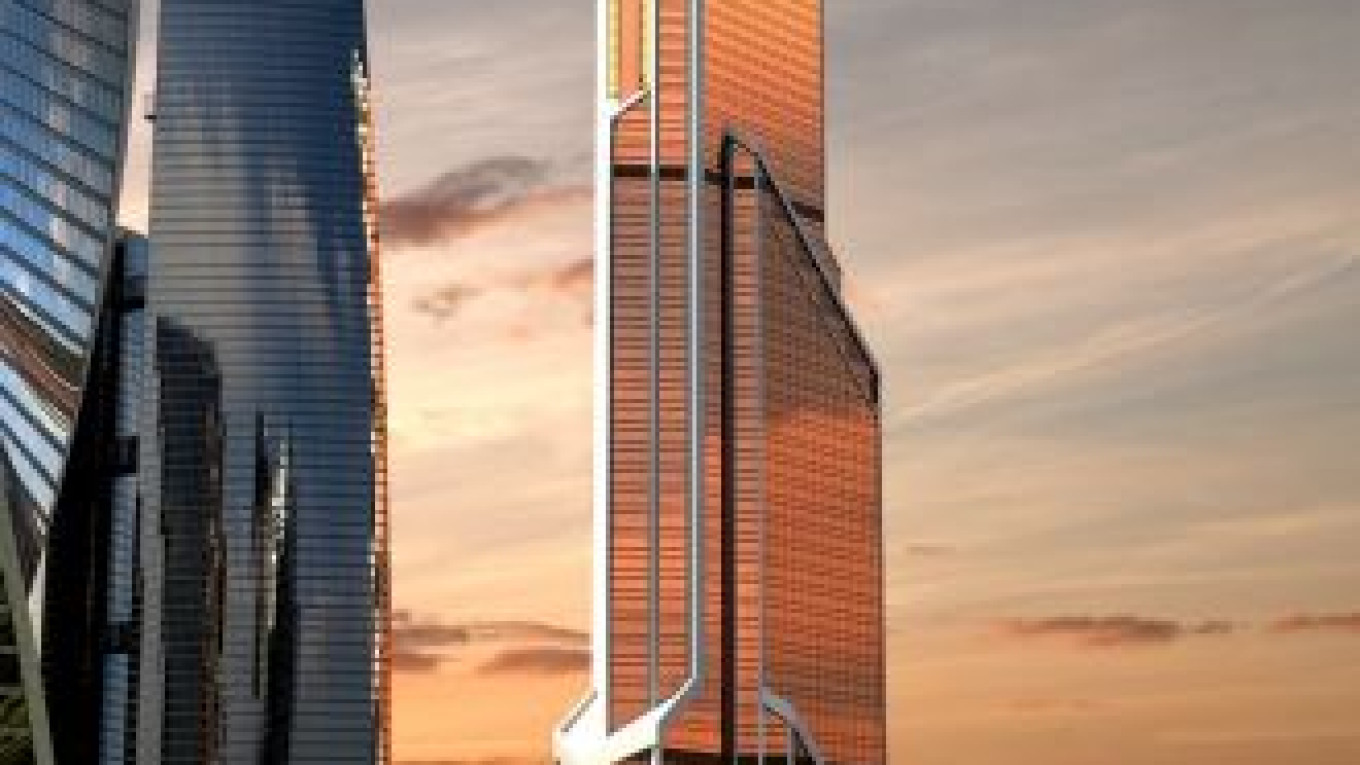Driving around Manhattan in early 1991, billionaire Igor Kesayev admired the Chrysler Building and Citigroup Center, thinking that a similar skyscraper should appear in Moscow someday.
Twenty years later this dream came true, resulting in Russia's capital getting the tallest building in Europe that overtook the previous leader: London's Shard.
The Mercury City Tower in the Moscow City financial district was ranked the continent's highest structure by German research firm Emporis after it reached its final height of 338.8 meters, said Kesayev, whose Mercury Development had just completed construction of the skyscraper.
The tower, which is almost 29 meters higher than its British peer, cost more than $1 billion to build, he said at a presentation of the project Thursday, adding that its implementation encourages Mercury Development to set more ambitious goals.
Several skyscrapers have been built in the city over the past few years, and there are more projects in the pipeline, with the expansion of Moscow City being under way.
Mercury Development CEO Vyacheslav Basati said that the district has good prospects to develop as a business center. He added that it is likely to concentrate more activities over the next few years as a result of City Hall's ban on high-rise construction in Moscow's historical center.
Earlier this year City Hall prohibited the construction of buildings that are higher than 75 meters in the city center in an effort to preserve Moscow's historical skyline. However, the regulations didn't affect the projects that had been approved prior to the ban and ones under construction.
The interior design of Mercury City, whose construction started in 2006, is to be completed by the end of this year. The 75-story tower, covered with gold-colored glass, was designed as a multi-functional complex whose total space amounts to 173,960 square meters, including 87,600 square meters of A-class offices and 22,360 square meters of apartments.
Getting the highest skyscraper in Europe is a significant milestone for Moscow, which marks its development as a financial center and will attract more global companies in the future, Basati said. He added that Moscow now has 87 buildings higher than 100 meters, which makes it "a city of skyscrapers."
Seven in Emporis' list of Europe's 20 tallest buildings are located in Moscow and include the likes of Capital City Tower and the Federation Tower in Moscow City, according to the research company's website. Mercury City is not yet on the list.
Apartment sales in the tower have already started, and the company is also in talks with potential tenants of the office space, with Gazprom, Rosneft and Rosatom indicating interest, Basati said.
He said monthly office rental rates in Mercury City range between $950 and $1,150 per square meter per month, which is close to the upper limit in the district. Average rates for offices in Moscow City stand between $650 and $1,000 per square meter without taxes and maintenance costs, according to Jones Lang LaSalle.
Basati said Mercury Development has yet to sign contracts to lease out offices in the tower, but he expects a surge in demand after the tower is completed, as tenants tend to choose completed projects to avoid risk.
The share of tenants who sign preliminary agreements to rent office space in buildings under construction currently stands at between 3 percent and 5 percent, down from 30 percent to 40 percent before the financial crisis of 2008, said Alexei Bogdanov, head of office department at S.A. Ricci.
Before the crisis there was a shortage of offices in Moscow, resulting in tenants seeking to secure space in advance, but the amount of vacant office space has increased sharply since then, he said by telephone.
"There are alternative options on the market. So why should a tenant risk and rent space in a building whose construction is still under way?" Bogdanov said.
The overall amount of high-quality office space in Moscow stood at 14.6 million square meters at the end of the third quarter, of which 13.2 percent was vacant, according to Jones Lang LaSalle.
A total of 12 new office buildings, including ALKON in the north and Park Pobedy in the west, will be completed in Moscow by the end of this year, adding 313,000 square meters of office space available for rent, the consulting company said.
Related articles:
A Message from The Moscow Times:
Dear readers,
We are facing unprecedented challenges. Russia's Prosecutor General's Office has designated The Moscow Times as an "undesirable" organization, criminalizing our work and putting our staff at risk of prosecution. This follows our earlier unjust labeling as a "foreign agent."
These actions are direct attempts to silence independent journalism in Russia. The authorities claim our work "discredits the decisions of the Russian leadership." We see things differently: we strive to provide accurate, unbiased reporting on Russia.
We, the journalists of The Moscow Times, refuse to be silenced. But to continue our work, we need your help.
Your support, no matter how small, makes a world of difference. If you can, please support us monthly starting from just $2. It's quick to set up, and every contribution makes a significant impact.
By supporting The Moscow Times, you're defending open, independent journalism in the face of repression. Thank you for standing with us.
Remind me later.


